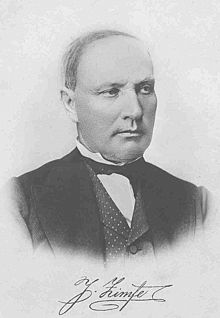Jānis Cimze
| Jānis Cimze | |
|---|---|
 |
|
| Born |
3 July 1814 Rauna parish, Vidzeme, Russian empire |
| Died | 22 October 1881 (aged 67) Valka, Russian Empire |
| Occupation |
Pedagogue Organist Composer |
Jānis Cimze (3 July/21 June 1814 — 22 October/10 October 1881) was a Latvian pedagogue, collector and harmoniser of folk songs, organist, founder of Latvian choral music and initiator of professional Latvian music. He is buried at the Lugaži Cemetery.
Cimze was born at the Rauna Manor's Cimze dairy farm (hoflage) in the family of a manor's dairy farm overseer Andreas (Ansis) Cimze and her wife Anne as the first child of 8 for his parents. His initial education came from Rauna Parish School where he also learned to play the organ. From the age of sixteen he worked as a private tutor; later he was a teacher at Valmiera Parish School and an organist.
In 1836 Cimze went to Germany to study at Weissenfels Teachers' Seminary which he finished in 1838. This was where he learned to play the violin and piano and improved his skills as an organist. In 1838—39 he was an external student at Berlin University where he attended lectures on mathematics, didactics and the theory of music. His music professor was Ludwig Christian Erk, a collector, harmoniser, publisher and researcher of German folk songs.
Upon returning from Germany, from 1839 and to the end of his life, Cimze headed Vidzeme Teachers' Seminary where he taught future teachers the conducting of choirs and harmonisation of folk songs. Cimze followed the principles of Johann Pestalozzi and Adolph Diesterweg and all education was conducted in German.
During his forty-two years of work at the Teachers' Seminary Cimze educated more than four hundred students who subsequently became Latvian and Estonian teachers. Being a teacher in the 19th century meant being also an educator, a musician, a literary and public figure. In the second half of the 19th century teachers organised choirs and worked with them and cultural societies.
Jānis Cimze promoted the development of Latvian choral singing and the cultivation of a cappella performance. His collection of songs for choirs "Dziesmu rota" (A Garland of Songs) was published in eight parts in 1872—84. This first ever professional collection of songs for choirs in Latvia formed the foundation of Latvian choir culture. Parts II (1872), III (1874), IV (1875) and VII (1884) of "Dziesmu rota", which go under the title of "Lauku puķes" (Wild Flowers), are the first collections of Latvian folk songs arrangements and represent a number of folk song genres: songs of seasons and family customs, work songs, farewell songs of recruits and conscripts, songs of orphans as well as songs for games and lullabies.
...
Wikipedia
